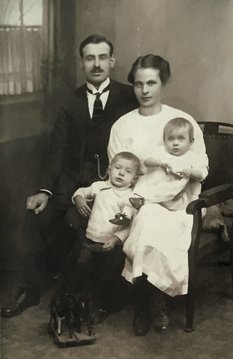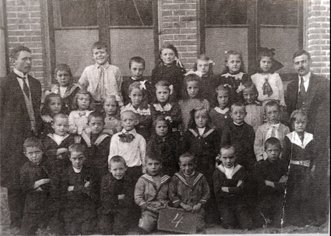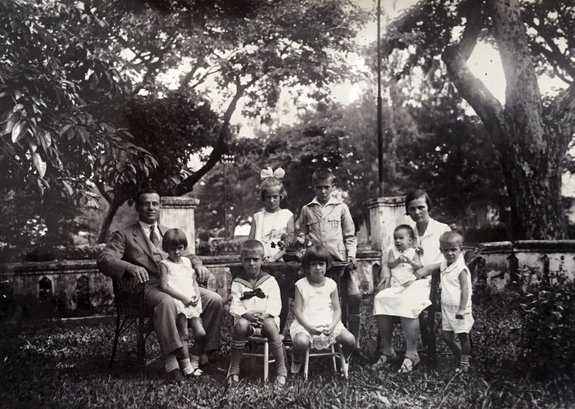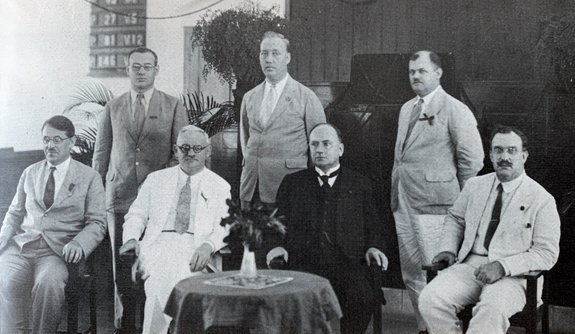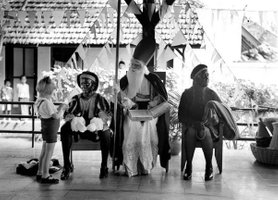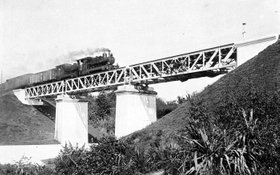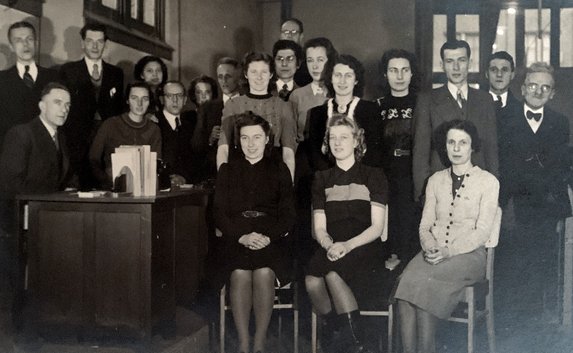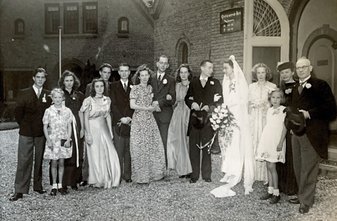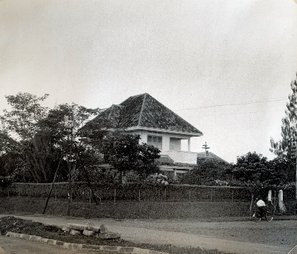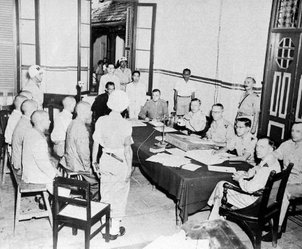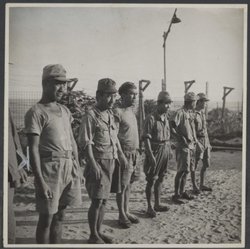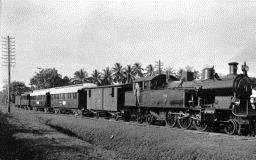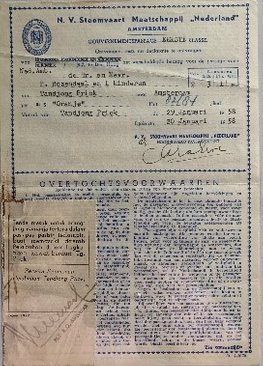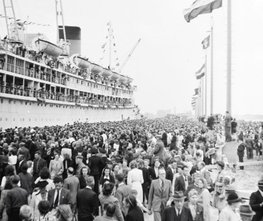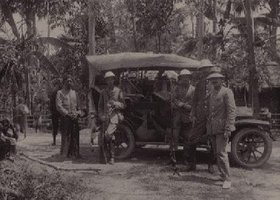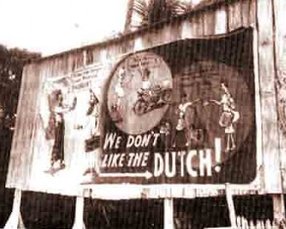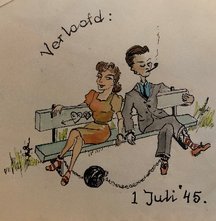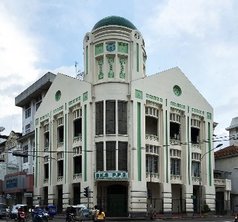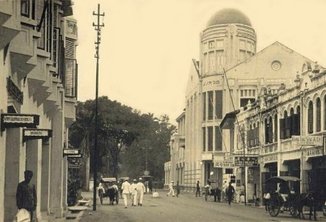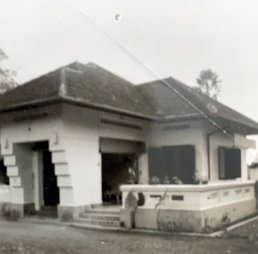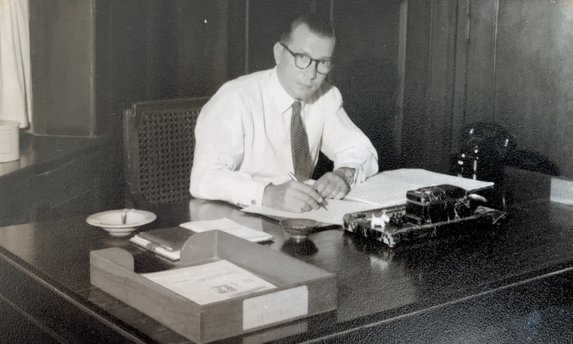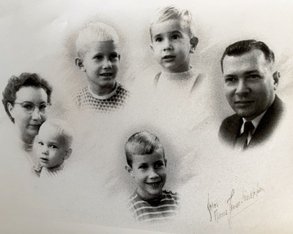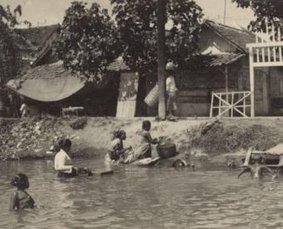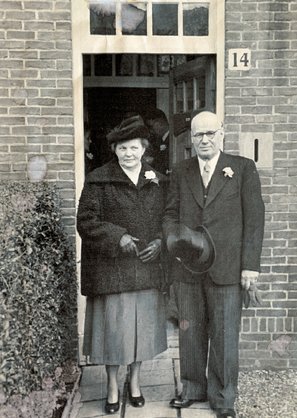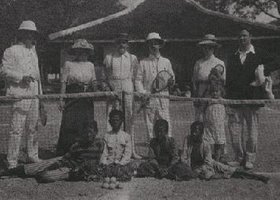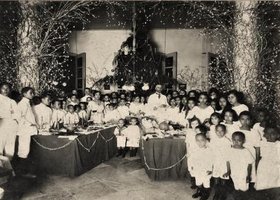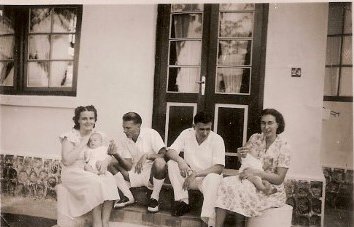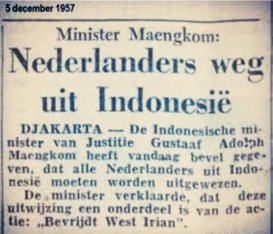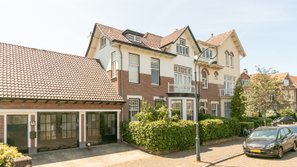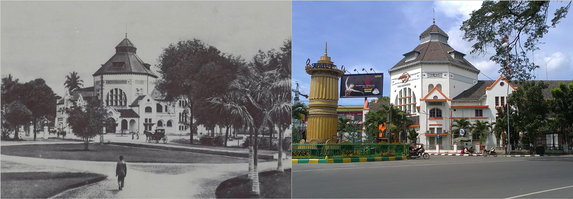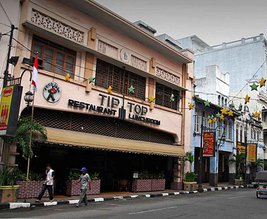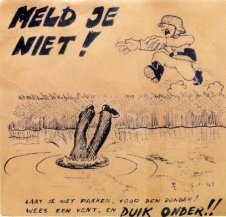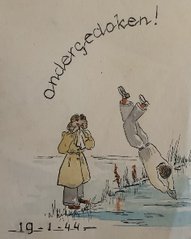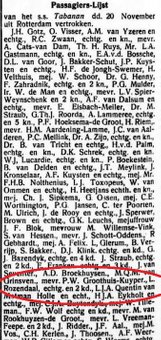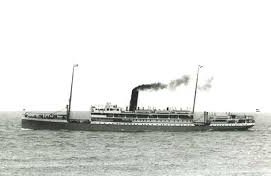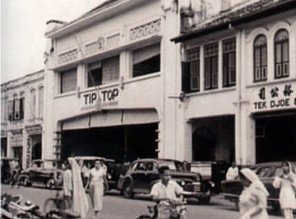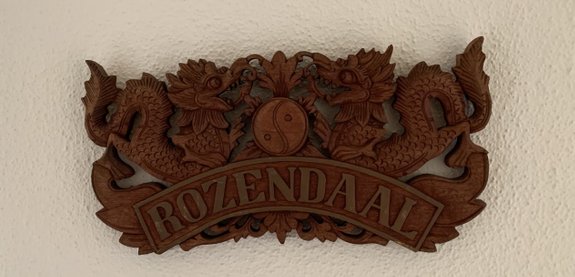I tried to write down the story of my father and his brother Jaap from the Dutch East Indies as clearly and concisely as possible. I am well aware that the story below is far from complete.
Their Indies story begins in 1920 with the broadcast to the Dutch East Indies of my grandfather Lijbert Rozendaal with his still young family (including my father) and ends early 1958 with the forced repatriation of my father and his family back to the Netherlands.
So the story can roughly be divided into three episodes:
I - THE PRE-WAR PERIOD (1920-1940):
Grandpa Lijbert (born in Oud-Beijerland in 1894) had been working as a teacher at several schools in the vicinity of Rotterdam for some years when he fell seriously ill in 1920.
He was a religious man and made a vow to the Lord: if he got well again, he would join the Mission in the Dutch East Indies to give Christian education to the local population.
He did indeed get better and resigned from his job in the Netherlands, which he was honourably granted.
In November 1920 he left for the Dutch East Indies with the s.s. Tabanan of the Royal Rotterdamsche Lloyd.
He is accompanied by his wife (our grandmother Teuntje van Driel, also born in Oud-Beijerland and also in 1894) plus their two children: my father Paul(us), born in Rotterdam in 1918 and my aunt Nan, born in Rotterdam in 1920.
Brother Jaap was the first child born in the Dutch East Indies in 1922 in Meester Cornelis, a suburb of Batavia (later Jakarta). Later on seven more children were born. Successively the family lived in the suburbs of Master Cornelis and Weltevrede near Batavia, in Soekabumi (West Java) and in Surakarta (Solo, Central Java). Grandpa Lijbert taught at the local high schools (Mulo) in those places and later became headmaster of the school in Solo.
It was a happy time for everyone. My father, Uncle Jaap and their brothers and sisters had a great childhood there, holidays and trips in the mountains all around, the swimming pool, tennis etc. and of course Sinterklaas and Christmas were celebrated there as well.
It was not for nothing called Tempo Doeloe (The Good Old Days).
Grandpa was also very active within the local Reformed Church:
They travelled twice (in 1927/1928 and in 1933) to the Netherlands on leave for a number of months. The first time they stayed with family in Oud-Beijerland in the old family mansion "Iependaal" at the bottom of the dike on the road to Rotterdam and the second time they stayed in a rented house in Heemstede. Renting a house was a necessity as the family had grown to such an extent that staying at the family house for a few months became too difficult.
Daughter Elsbeth of Aunt Jeanne wrote to me about her mother's general experiences as a little girl in the Dutch East Indies and a beginning adolescent:
"She has always told me about her childhood in the Dutch East Indies with her share of melancholy. When the aunts were together they regularly returned to their youth. All the Malaysian words they remembered would be recited, quite precious! Our grandmother was almost continuously pregnant in the Dutch East Indies. This was very hard on her as she suffered from migraine a lot but...luckily she had her staff. Grandpa was headmaster of the school there and therefore a well thought off person. The children enjoyed themselves in and around the house and of course an accident sometimes happened. One of the children almost drowned in a pit (dug by one of the uncles) that was flooded during an enormous tropical rain shower. The holidays were spent in the mountains because of the pleasant temperature that prevailed there. They also came "on leave" to Holland a few times and stayed with family in Oud-Beijerland. There were contacts with other Dutch families in the Indies and later those contacts were carried on after their remigration in the Netherlands. This is some general information I can give you. For the rest it is personal experiences with girlfriends, school, sisters, brothers and the trip back to Holland. My mother has never been back to Indonesia. That is something I never understood. When I asked her "Why didn’t you ever go back?" she answered that her memories were enough for her".
In Surakarta the foundation was laid down for the later passion of both my father and his brother Jaap: steam trains. As children they played a lot at a railway track, under and on a viaduct. Ever since that time, an interest in steam locomotives had laid dormant in both of them.
Later in Rotterdam, father's passion was filming. He has made dozens of 8-mm films about steam locomotives all over the world. He also collected models of these and built gigantic model railways in the basement of his later home in Rotterdam. Brother Jaap has also written a book about steam trains in Indonesia. He also supplied many articles for the English railway magazine "Locomotive International".
Father had his basic education in the Indies: Primary School and MULO-B (final diploma in 1934). He then went back to the Netherlands on his own to do the Gymnasium-B (final diploma in 1938) and then went to Leiden to study law with the Adat (Indonesian customary law) and Indonesian agricultural law as specialisms. He already knew then, that he would return to his "roots", his beloved Dutch East Indies.
Brother Jaap also went to primary school and the MULO in the Indies, in Solo.
As it turned out later on, Grandpa and Grandma felt the threat of the imminent invasion of Japan coming. After my father had travelled to the Netherlands for his studies, Grandma followed a short time later in 1939 with the other children with the m.s. 'Johan van Oldenbarnevelt'.
Finally, Grandpa joined them in early 1940. He first wanted to build up a full pension. At that time, the years having worked in the tropics counted double for the pension.
Grandpa arrived in the Netherlands just one week before the German invasion. They settled in Haarlem at Zomerluststraat 14. Grandpa and Grandma continued to live in Haarlem until his death in 1973 and subsequently her later move to a nursing home and her death in 1984.
II - THE SECOND WORLD WAR (1940-1945):
During this period, the family was not in the occupied Dutch East Indies (1942-1945).
Father was called up for military service as part of the General Mobilisation in 1939. He was assigned as commander to an anti-aircraft gun in Bergen aan Zee, where, in the May days of 1940, they shot another German bomber out of the sky on his way to a target, which ended up further out at sea.
As the occupying forces had closed Leiden University in May 1942, he was not able to graduate at that time. He also had to go into hiding together with his brother Jaap in 1944 to escape the German Arbeitseinsatz.
They found a hiding place under the floor of the house in Haarlem and managed to escape discovery during a Gestapo search in 1944. The drawing on the right belongs to my mother, who was quite good at drawing and handicrafts. During the years of occupation, she obtained a teaching certificate for this. In the later years in Rotterdam the making of so-called character dolls became her great passion.
Uncle Jaap followed a three year terms at the HBS (High school) in Haarlem, and then went to the MTS where he graduated in Mechanical Engineering in 1944.
During the war, the family did not have an easy time feeding and dressing so many mouths, that the children who were able to do so sometimes joined in the so-called “hunger runs” to go to other towns looking for food.
III - THE POST-WAR PERIOD (1946-1957):
After the liberation, father was finally able to graduate in 1946 and joined the Distribution Service in The Hague. There he met my mother Carla Koentze.
They got engaged on 1 July 1945 and married in the Netherlands in 1946.
In that year they left separately for the Dutch East Indies. First father went to "make quarters" and look for a job. As an aftermath of the war in the Dutch East Indies, the Dutch were called upon to rebuild that part of the Kingdom as well.
Mother had no choice, but actually found it all quite exciting. She followed some time later with the m.s. Sibajak of the Royal Rotterdamsche Lloyd. This was a crossing with only women and children, who followed their husbands and fathers.
Father was appointed as a Substitute Public Prosecutor (Auditor-Military) at the Temporal Military Court in Medan. His task was to prosecute and bring Japanese and Korean military war criminals to justice, as well as members of the Kempetai (the much feared Japanese Secret Service).
He had to attend several executions of war criminals indicted by him and sentenced to death by the court. Others escaped by a hair’s breadth and were acquitted or given lower sentences than those demanded, because the evidence could not be obtained, or could not be obtained to a sufficient extent.
The period immediately following the Japanese capitulation on 15 August 1945 and the declaration of independence by Sukarno and Hatta was a very chaotic one due to the power vacuum that had arisen. This was called the Bersiap. This period was a period of great danger for the non-full blooded Indonesians living in the Indies. Many of them were murdered by young people armed with bamboo spears and axes in a horrific way. This violence lasted until 1946.
After having worked for the company “Werkspoor” for a short time, Uncle Jaap left for the Indies again in 1947, later followed by his wife Chris, whom he married in October 1947. He became a train driver at the Sisal factory Laras on Sumatra and later at the palm oil factory Tindjowan.
In 1952 he returned to the Netherlands with his wife and their son Robert, who was born in 1949, because of the political difficulties that increasingly arose against the Dutch still living and working in Indonesia.
However, his return to the Netherlands was a brief interlude, as he left for Southern Rhodesia in 1953, later followed by his wife and son. They settled in Salisbury, later to become Harare.
After the transfer of sovereignty at the end of 1949 until the end of 1950, father tried to work as an independent lawyer. This was not really very successful, because the Europeans, and the Dutch in particular, were boycotted by the Indonesians and so he did not get a foothold.
In November 1950, he returned to the Netherlands, disillusioned with his wife and child, with the m.s. Johan van Oldenbarnevelt of the Stoomvaart Maatschappij.
In 1952 he returned to his beloved Indonesia, where he had received a fine appointment in Medan on Sumatra as 3rd and later 2nd Secretary at the head office of the A.V.R.O.S. (General Association of Rubber Planters on the East Coast of Sumatra). At this employers' association of plantation companies in rubber, tobacco, palm oil, fibre and tea in North Sumatra, his knowledge of Adat and Indian agricultural law came in very handy.
In 1957 the A.V.R.O.S. "sent" my father to Jakarta (previously known as Batavia) to take the responsibility as their representative towards the public authorities of the government.
My eldest brother Roel told the following story from this period: he had a quarrel with a few Dutch friends with a number of boys from the nearby Kampong, where a lot of stones were thrown at each other. Eventually they had to run away because the force majeure became too great.
Roel fled, with in his wake some of the Indonesian boys, to the parental home, where he was, to his surprise, dismay and disappointment, given a good spanking by dad, in front of the boys. What a humiliation! But it was a wise decision of father. It would probably have ended very differently with the family, because at that time anti-Dutch sentiments were growing day by day. Violence was not shunned.
His brother Jaap was the only one to return to the Dutch East Indies after the war. He went to work as Head of Technical Services of a sisal plantation on Sumatra. As a direct consequence of the increasing and especially politically motivated tensions, he and his family left as early as 1952 for Rhodesia, later named Zimbabwe. His story can be found elsewhere on this website.
He had anticipated this well, because in the context of the New Guinea crisis on 5 December 1957 (later called Black Sinterklaas) all Dutch people were declared by the Indonesian government to be undesirable foreigners and enemies to the state. It was the climax of the anti-Dutch mood that had prevailed for months in the former colony. And there they went... towards a fatherland unknown to many including the Rozendaal family.
In the end, the family consisted of father, mother and four boys, including myself as the third child. The first child was a girl, but unfortunately she died almost immediately after birth in 1947 of a so-called "spina bifida" which was life threatening at that time. Eldest brother Roel (bottom) was born in 1949, Wouter (above left) in 1951, during leave in the Netherlands, me (above right) in 1953 and youngest Ben (sitting on mothers lap) in 1955.
Mother was at peace with it, but father had great difficulty in returning permanently to the Netherlands, leaving behind all his possessions and retuning with memories only. After all, he had grown up in that beautiful country.
On the 29th of January 1958 our family returned to the Netherlands with the ship the m.s. Oranje. Father was then 40 years old, mother 35 and the four children respectively 9, 7, 5 and 3 years old.
Mother once told us that she had managed to smuggle hard cash (guilders) out of the country by sewing them into the shoulder pads of her dresses. This was strictly forbidden and therefore actually very risky. Fortunately, father's employer had also built up a savings account in the Netherlands for him so that they could get through the first period of time.
We found accommodation in a so-called contract pension in Haarlem at Zomerluststraat 20. Grandpa and grandma's family also came to live on Zomerluststraat 14 after their remigration from the Dutch East Indies in 1939/1940. The photo under grandpa and grandma shows that fortunately little has changed in that street in all those years. An unimportant but perhaps nice detail: the well-known TV-series "Divorce" was recorded there.
My first very vague memories of childhood come from that time. They are quite positive, despite the difficult time for the returnees, who had to build a completely new life. As children, however, we did not really know anything about this. Almost the entire family was already living in Haarlem and Heemstede at that time. As a result, we had many nephews to play with. Their also were female cousins, but we didn't play with them, because they were stupid....;-).
Following my father's work, the family moved first to the Beukelsdijk in Rotterdam, then to nearby Bolnes and then to Bruges in Belgium. In 1964 father returned to Rotterdam because of a nice job as Head of Personnel at Stad Rotterdam, an insurance company, where he stayed until his disability due to a car accident in South Africa.
My parents also stayed in Rotterdam until they moved to apartment for senior citizens in Almere-Haven, where my brother Wouter and his wife Hermieke, who were already living nearby, were fantastic carers for them.
Father died peacefully in his sleep in 2008, Mother in 2013 after having spent two years with in a (closed) retirement home due to increasing dementia.
Finally:
The most important question that still remains unanswered in my mind is what motivated my father to go back to Indonesia in 1946 during that terrible Bersiap period to work as a young lawyer and start a family. Then, in 1952, to go again amidst the still existing and even growing anti-Dutch sentiments among a large part of Indonesians and the growing political tensions between the Netherlands and Indonesia.
He probably always hoped and therefore thought that things would not change so fast.
Another question that was answered by many was why, after the forced repatriation, they never wanted to visit Indonesia again: they wanted to retain the Indies feeling of Tempo Doeloe.
Since 2007 I have returned three times to Medan, where we lived at the time and I was born. While visiting our old house, I met a very old woman, by chance, who claimed that she had worked as a Baboe for the Rozendaal family as a young girl. (* The house on the left in the pictures below on the right)
Although at the time of repatriation I was a little boy of only four years old and therefore without any clear memories, during those visits back to Indonesia, I did occasionally get a sort of Indies feeling about me, the heat, the smells, the people, in fact everywhere where Indonesia had not yet taken off and 'progress' had not yet struck. Cities like Medan have unfortunately become big, busy and dirty.
The A.V.R.O.S. headquarters in Medan, built in Art Deco style, is still there and has recently been beautifully renovated, like more and more buildings in Indonesia from the Dutch East Indies period.
Especially the current generation is more and more interested in this "Shared Heritage". This is absolutely no longer a loaded subject for them.
Of course there is also the delicious food at Restaurant/Lunchroom Tip-Top, which was already one of the places to meet in Medan all those years ago. And looks as if time has stood still...
I would have liked to ask my parents and grandparents more questions about the Indies time of the family...but unfortunately it never came to that...both grandfather and father were introverted men within the family, who seldom or never told anything about themselves or about the time in the Dutch East Indies and later in Indonesia....
I waited too long because I was too busy with family and career....
Such a pity !
Guus Rozendaal, October 2020

